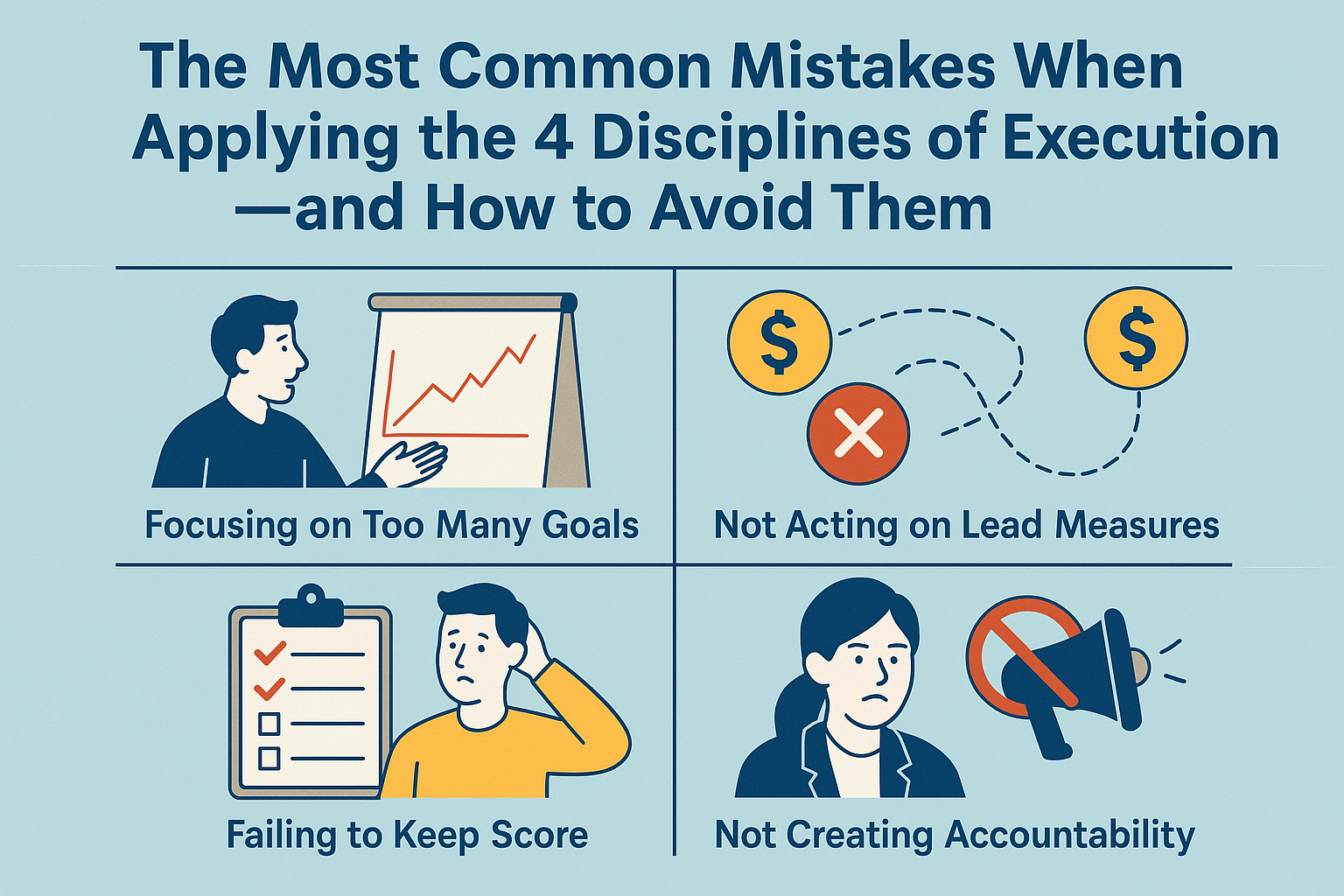The 4 Disciplines of Execution (4DX) is a powerful framework for turning goals into reality. But like any method, its success depends on how well you apply it. Many individuals and teams get excited about the idea, but then make small errors that undermine results.
In this article, we’ll explore the most common mistakes people make when using 4DX—and how you can avoid them to stay on track and maximize success.
1. Trying to Focus on Too Many Goals
The mistake: Setting 3, 4, or even 10 goals and calling them all “important.”
Why it’s a problem: The power of 4DX comes from narrowing your focus. Spreading attention across multiple goals reduces execution quality and increases mental overload.
How to fix it:
- Choose one Wildly Important Goal (WIG) at a time—two at most
- Ask: “If I could only accomplish one goal in the next few months, what would it be?”
- Delay or delegate secondary goals
2. Vague or Unmeasurable WIGs
The mistake: Choosing goals like “be more productive” or “grow the business” without defining how success will be measured.
Why it’s a problem: You can’t achieve what you can’t define. Vague goals lead to vague actions—and little progress.
How to fix it:
- Use the format: “From X to Y by [date]”
- Example: “Increase monthly revenue from $2,000 to $4,000 by October 1”
- Make your WIG specific, measurable, and time-bound
3. Ignoring Lead Measures
The mistake: Only tracking outcomes (lag measures), like income or website traffic, without focusing on daily or weekly actions.
Why it’s a problem: Lag measures are historical—you can’t influence them directly. Without lead measures, you’re reacting, not driving change.
How to fix it:
- Identify 1–2 lead measures per WIG
- Choose actions that are both predictive and influenceable
- Track them consistently every week
4. Creating a Complicated Scoreboard
The mistake: Building a scoreboard that’s so detailed or technical no one uses it.
Why it’s a problem: If it’s hard to understand or update, people ignore it. And if no one sees the score, they stop playing the game.
How to fix it:
- Keep it simple and visual: color codes, checklists, graphs
- Make it visible and accessible—don’t bury it in a shared folder no one opens
- Update it regularly—ideally weekly
5. Inconsistent Accountability
The mistake: Skipping weekly check-ins or letting accountability sessions turn into vague conversations.
Why it’s a problem: Without consistent rhythm, people lose focus. Without real accountability, commitments fade.
How to fix it:
- Schedule a recurring weekly meeting or self-review
- Follow a clear agenda: Review last week’s actions → Evaluate scoreboard → Set next week’s commitments
- Celebrate wins and reflect on misses without judgment
6. Treating 4DX Like a To-Do List
The mistake: Thinking 4DX is just another way to manage tasks.
Why it’s a problem: 4DX is about execution of strategy, not everyday operations. It’s a system for achieving transformational goals, not managing daily chaos.
How to fix it:
- Apply 4DX to goals that require focus and long-term effort
- Use other tools (e.g., planners, task managers) for daily tasks
- Reserve 4DX for goals that matter most
7. Giving Up Too Soon
The mistake: Expecting immediate results—and quitting when they don’t come fast enough.
Why it’s a problem: Execution takes time. Momentum builds slowly. Without patience, even great systems fail.
How to fix it:
- Commit to the process for at least 6–12 weeks
- Track progress weekly—even small wins matter
- Adjust as needed, but don’t abandon the system too early
Final Thoughts: 4DX Is a Discipline—Not Just a Tool
Execution isn’t about perfection. It’s about consistent progress. The 4 Disciplines of Execution work when you apply them with clarity, simplicity, and discipline.
Avoiding these common mistakes doesn’t require genius—it just requires intention. Focus on what matters, track what you can control, stay visible, and show up every week.
If you do that, 4DX won’t just help you achieve goals—it will change the way you work and live.
